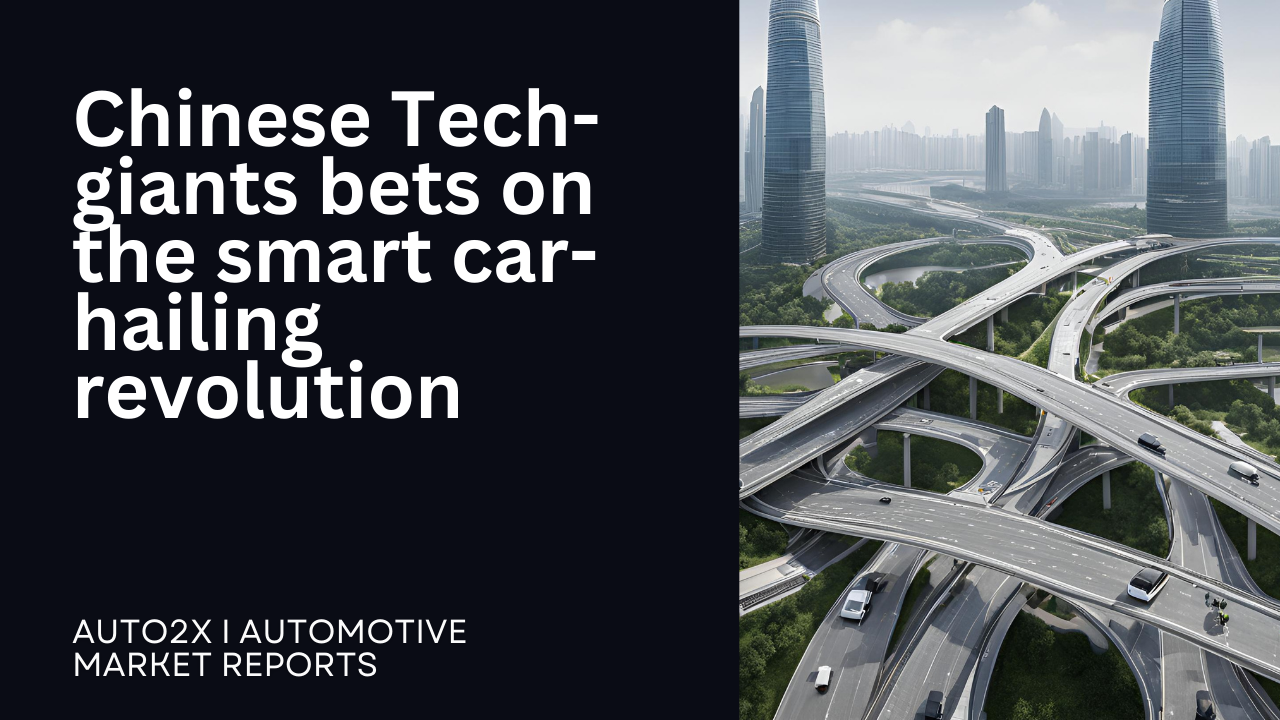- Innovative business models from Chinese tech-giants shape a new battlefield for “smart online travel”
- Alibaba and Meituan lead “the aggregated” model towards future smart mobility
- Baidu’s Autonomous Driving-oriented ecosystem leads the “driverless car hailing” operating model
- Huawei and Tencent lead the “empowerment group” towards “connected car-hailing“
Chinese tech-giants are consolidating the building blocks for smart travel services, as China’s sharing economy is expected to bounce back
According to China’s Sharing Economy Development Report (2021), China’s sharing economy is expected to rebound anywhere between 10-15% in 2021, maintaining an annual growth pace of 10% in the following five years. As of Jan 2021, 214 online car-hailing companies have been approved to operate in the country, according to the China Ministry of Transport, with the number of orders in online platforms reaching around 21 million per day.
Carmakers’ “Manufacturing + Travel” model is seizing data resources…
Since 2018, nearly ten Chinese carmakers have launched online car-hailing services; SAIC with Xiangdao Chuxing, Great Wall Motors with Ouzou Chining, Guangzhou Automobile Group (GAC) with Ruqi Travel, Dongfeng Motor with Dongfeng Travel, and Geely with CaoCao Mobility.
…whereas Tech-giants’ innovative models aim to coordinate on-demand vehicle and ride sharing at unprecedented scale
Among Chinese tech-giants, Alibaba has launched the AutoNavi open ride-hailing platform, Tencent and Alibaba backed T3 travel, Baidu has backed Shouqi travel platform; and Meituan has also established a travel business unit.
Chinese tech-giants are expanding from the e-commerce takeaway business to the business areas of taxis, shared vehicles, and unmanned driving.
Auto2x
In China’s online car-hailing market, although Didi “looks at the crowd”, it cannot drive small and medium platforms out of the market
Since 2016, Didi Chuxing has been the dominant ride hailing operator in China, providing car-hailing services to the vast majority of ride hailing users. Didi has completed multiple rounds of financing in the past nine years; the investors include SoftBank, Uber, Tencent, Alibaba, Toyota, and Foxconn.
According to a prospectus recently published by Didi, the largest institutional shareholder of Didi is SoftBank, holding 21.3%, followed by Uber, holding 12.8%, and Tencent holding 6.8%. Didi is now focused on the deployment of its new D1 smart-EV; whereas it also develops autonomous driving technologies above Lv.3, aiming to reinstate the operational efficiency of its online car-hailing services.
Promoting unmanned driving in a full sense by deploying robotaxis in areas where there is a shortage of ride-hailing car supply might be Didi’s ultimate goal as competition moving toward “software economics”; and autonomous driving represent the direction of future travel services.
At the same time, China’s leading tech-giants are deploying innovative “car-hailing models”, looking to leverage their competitive advantage in software and hardware development toward the new stage of “smart-travel and autonomous driving” era.
The “aggregated” model led by e-commerce giants Alibaba and Meituan
In July 2019, the AutoNavi Open Platform began to vigorously promote the “key-ride-hailing aggregation” service.
The so-called aggregated model is simply a “platform of platforms” for online ride-hailing; where the users can get access to multiple car-hailing companies at the same time through the aggregation platform app; and obtain corresponding services. In addition to its aggregated online platform, Autonavi has provided map, navigation and route planning services to several domestic travel applications, including Didi Chuxing and Yidao, covering various market segments such as taxis, private cars, downwinds, and express trains.
In December 2020, the “Good Rental” network integrated digital system was launched by Autonavi in order to support taxi companies in terms of traffic, technology and services. Based on Autonavi’ capabilities on map positioning and real-time traffic data, the system aims to help the government and enterprises establish a big data platform to grasp the operating conditions of taxis in real time, predict taxi demand, and dispatch vehicles scientifically. The system also allows taxis to take orders online, dispatch orders for drivers and thus reduce empty driving rates; whereas enables passengers to realize the same digital services as online car-hailing; such as route selection, itinerary sharing, online payment, electronic invoices, and anonymous evaluation.
In February 2017, Meituan’s self-operated taxi-hailing model was launched. By upgrading the in-vehicle intelligent terminal system and implanting the capabilities of the online appointment platform, Meituan’s taxi-hailing platform synchronises the driver’s mobile phone and the status of the vehicle terminal, so that the driver can use the vehicle terminal to receive real-time online orders, and the mobile phone to receive reservation orders when getting off the vehicle. On the other hand, passengers can use the “Taxi-service” entrance of the Meituan App to realize online taxi-hailing; whereas at the same time,they can ask for a taxi offline, check the driver and vehicle information, identify licensed cars etc.
In April 2019, the “aggregated model” was launched in Meituan’s app, to provide users with more choices for travel through access to mainstream ride-hailing providers such as Shouqi and Cao Cao Mobility.
Baidu introduces driverless services targeting robotaxi commercialization
As in the case of AutoNavi, Baidu also has access to driving, taxi, and public transportation. Baidu Zhixing (smart travel) leverages big data tools to offer a diversified travel solution to users; whereas provides car-hailing operators with intelligent in-house built solutions; such as the Onboard OS Xiaodu, the deep learning framework ‘PaddlePaddle’, the Baidu intelligent Cloud, and the Baidu-Maps tool.
Baidu’s app-based ride-hailing itinerary recognition solution is currently deployed in several domestic providers, including CaoCao Mobility, Didi Taxi and Sunshine travel; whereas Baidu’s big data and cloud computing technology integrates in GWM ‘s Ouzou Mobility ride-hailing ecosystem.
Baidu Apollo “ACE Transportation Engine”, discloses Baidu’s business plans in artificial intelligence, autonomous driving, and vehicle-road collaboration.
Baidu has been developing smart car technology for many years, including high-definition maps; and established its autonomous driving division, Apollo, in 2017.
Baidu sees driverless services as an indispensable step toward the widespread deployment of automated driving technologies
Baidu
Baidu Apollo joins hands with Shouqi to launch an one-key call self-driving taxi service
In December 2020, Baidu Apollo GO officially announced a partnership with ride-hailing provider Shouqi. The Apollo GO autonomous driving service will enable users to hail a robotaxi directly through the Shouqi or the Apollo GO apps.
In addition, Baidu will provide Shouqi with the DuerOS intelligent vehicle linkage solution in the Apollo open platform to help Shouqi intelligent upgrade. The DuerOS smart car connection solution of the Apollo open platform offers advanced technologies such as speech semantics, face recognition, and AR navigation. Baidu will also provide comprehensive support for the successful integration of Baidu maps in the Shouqi travel platform, and the two parties will jointly optimize the Baidu map database.
Tencent, Alibaba and 3 major Chinese carmakers launch T3 Travel
Changan Automobile, FAW and Dongfeng launched T3 Chuning in July’19, a ride hailing venture that currently operates in 21 Chinese cities, including Shanghai. The mobility platform that is also backed by tech giants Alibaba Group and Tencent Holdings; aims to develop a shared electric vehicles platform and to expand its services into a further 27 Chinese cities in 2021. According to recent media reports, T3 mobility platform has declared its ambition to fully replace all its vehicles with autonomous ones by 2027.
According to company data, in 2020, T3 Chuning deployed more than 40,000 vehicles and completed 150 million trips.
Tencent and GAC establish Ruqi Travel online ride-hailing platform
Tencent’s announcement stated that Ruqi travel will use the models of GAC Trumpchi and GAC New Energy, and will be equipped with the Tencent Autolink intelligent system, an intelligent network connection system that incorporates a selection of Tencent apps and functions into the in-car system, and provides location-based services and service applications, on-car WeChat service, Tencent Cloud etc.
Ruqi Travel represents an important layout for GAC Group in order to extend its auto service industry chain and explore the transformation from a traditional car manufacturer to a mobile travel service provider. At present, Tencent’s support is mainly focused on user traffic import and technical support. In the future, the two parties will further explore deeper forms of cooperation, make full use of Tencent’s strong software and data integration capabilities, and improve the construction of Ruqi’s networked shared travel ecosystem.
Huawei integrates its Cloud computing platform in JAC’s electric ride-hailing service
JAC Motor launched the Hexing platform in late 2019, which marked JAC’s official entry into the online car-hailing business. JAC fully-electric ride-hailing vehicles integrate Huawei Cloud services, including cloud resources, cloud security and other overall solutions. Currently, JAC Motors and Huawei continue their cooperation to comprehensively improve the intelligence level of JAC’s in-vehicle ecosystem and realize a safer and more efficient travel life in the era of “5G + Cloud + AI”.
Read more
To learn about Carmakers’ strategies, market positioning and leadership in MaaS read our report “Carmakers’ Competitiveness in Smart Mobility“.
To learn more about competition and market developments in the next decade read our reports

